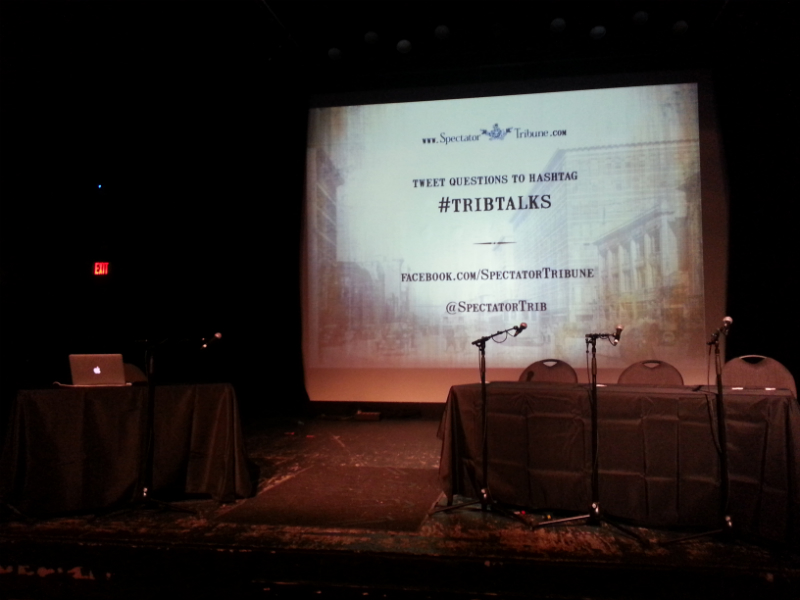The Spectator Tribune’s first ever Trib Talk saw a healthy crowd take their seats in Park Theatre on May 28th to watch three panelists jive over one of Winnipeg’s most perennially popular topics: the fate of the city’s downtown.
Councillor Jeff Browaty anchored the practical, day-to-day experience side of things, self-described ‘urban political hack’ Brian Kelcey brought the public policy expertise and experience, and the Spectator Tribune’s own all-things-urban specialist Robert Galston ensured that the grassroots, ground-up elements to building a thriving downtown were not lost in the fray. No panaceas emerged from the discussion — which was capably guided by moderator Dr. Jino Distasio, director of the Institute of Urban Studies at the University of Winnipeg — but the panelists distilled several themes from the Great Winnipeg Downtown Debate as the ones to pay attention to. These included:
Gentrification, is it good or bad? A good chunk of the audience provided the general response of “bad, duh.” Public policy guru Kelcey, however, wasn’t so sure. Gentrification may mean the sign of a neighborhood’s success. If people with money move to a place in droves, surely it means that that place has become an attractive, clean, and safe nook of the city in which people can — mind the catchphrase — live, work and play all in one go. The key is not keeping ‘the middle class’ out, but in avoiding the sort of accidental social exclusion that can occur when they move in (ie. higher demand and ability to pay, increase of prices, low-income residents can no longer make ends meet, they’re forced to move to more affordable, but potentially more dangerous parts of the city, etc, etc). Galston added that, short of explicitly excluding people with money, there isn’t actually anything that can be done to halt gentrification in progress. The focus should thus not be on lamenting its arrival, but how to provide policy solutions to this arrival that take the established residents into account.
The ever prominent safety issue. Councillor Browaty provided a straight forward solution, and a relatively prominent one: more feet on the ground. Actual crime levels in downtown Winnipeg may be equal to or lesser than those found in the downtowns of the triple-S (sleek, safe, ‘n sexy) — my words, not his — cities of North America, but it certainly doesn’t feel that way when the sidewalks and buildings are quiet and largely empty. How to get more people living closer to downtown, and simultaneously solve the city’s housing issue? Kelcey suggests selecting a number of the parking lots in the area and constructing smart, non-flashy buildings in which people can live. Not the type of buildings that are announced through the city’s booster culture media — his words, not mine — but ones that are put up in six months, not six years, and that fit in with their surroundings
The role of the private sector. Kelcey stressed that the great work of small businesses aside, the private sector in the city all too often waited for government to lead or to help, and some times in inappropriate ways. Later comments by Councillor Browaty, however, inadvertently complicated that stream of thought. As the water park fiasco made its inevitable appearance in the discussion, Browaty reminded the crowd that the city was ‘in the pool business.’ The public pools in Winnipeg are largely city-run. This is something to keep in mind for all those who might — rightfully — call for a braver, more creative private sector in Winnipeg; there are constraints in a city this size. If governments don’t step up, private actors may not see the kind of markets that warrants, to them, the dolling out of cash. This implicitly raised a question that wasn’t directly tackled by the panel: how much of the downtown dilemma is a function of systematic and structural limitations that the city faces, the kind that cannot be diminished by tweaking the private-public dynamic?
Those developers. Lamentation flowed from the crowd and some of the panel discussion towards developers that buy properties and then sit on them, without any sort of development that makes it a living part of its surrounding community. When ranking the city’s overall role in regards to downtown development throughout the last decade, Galston gave it between a ‘C’ and ‘D,’ but he did mention that the work that has begun to keep developers accountable is a healthy — mind the pun — development.
The first Trib Talk, all in all, was a great success. It demonstrated that this enduring topic is enduring for a reason, that discussion on it should continue, and that Winnipeggers don’t mind sipping locally brewed beer while discussing urban policy. Much can also be learned from this first Go At It. One thing mentioned in the event’s lead up, during the panel discussion, and afterwards by attendees, was the lack of diversity on the panel. The Spectator Tribune is listening. Other common suggestions noted that the use of audience interaction such as microphones and twitter could have been used even more. Again, Spectator Tribune is listening. Given the overall reception it is clear the Trib will keep Talking; the city’s downtown is but one out of a multitude of topics that Winnipeggers and Manitobans can and should discuss. Stay tuned to Spectator Tribune for upcoming Trib Talks dates and topics.
__
Johanu Botha is a student of public policy and political philosophy. His hobbies include the mandolin and intermittent bouts of existential angst. You can reach him at johanu.botha@mail.mcgill.ca
